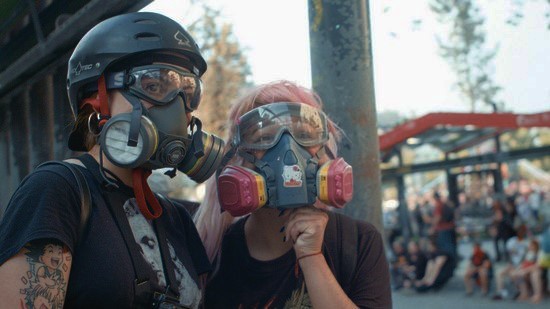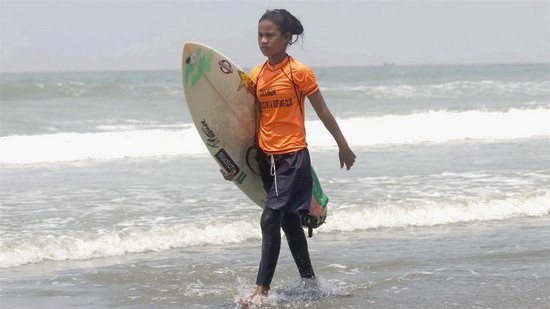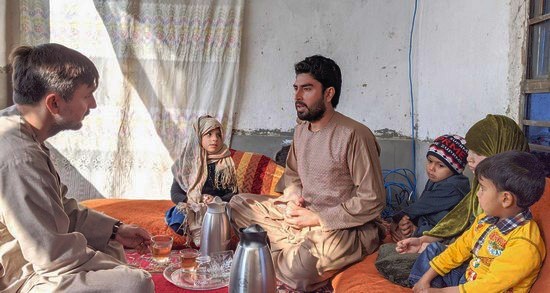At
Berlin Human Rights Film Festival-Amman Edition, which starts today and lasts
for three days, lovers of documentary films will for sure enjoy the three
screenings that tackles climate change issues through women activists in
different countries, women rights, and raging war.
اضافة اعلان
The festival is organized by the
Royal Film Commission, in cooperation with the German Embassy in Amman. The selected
films, which won several prizes, are screened at The Rainbow Theater at 7 pm.
“Dear Future Children”, by
Franz Böhm, follows three
activists fighting for change, in need of social and political reforms and
independence.
 Dear Future Children
Dear Future Children
The three women activists, from
Hong Kong, Chile,
and Uganda, are Hilda, Rayen, and Pepper; they send a message to the world
through participating in social actions to better the place they live in,
seeking an improvement of the situation for the next generation.
In Chile, Rayen, protests against social justice,
risking imprisonment and brutal beatings to change the regime; Pepper is working
against rejecting the imposition of Chinese rule since the British handover and
the removal of freedoms; Hilda is a climate change activist in Uganda.
The women protagonists in Böhm’s film are powerful
and inspiring. The film focuses on the longer term consequences of suffering at
the hands of governments, which pushes the activists to fight to achieve their
goals no matter what the price is. It investigates the impact activism has on the
lives of the young protestors while attempting to provide a platform to the
individuals and movements who do not often make the headlines.
The question of course remains whether such action can really be a catalyst for change at a political level where it really matters, particular on global issues such as climate action, democratic rights and the end of gender and race-based oppression.

Dear Future Children
It also draws the attention to the rise of youth
activism, specifically the one led by Gen Z, and the goals they can achieve because they are ,
willing to protest to support the issues they care about online and on the
ground.
The question of course remains whether such action
can really be a catalyst for change at a political level where it really
matters, particular on global issues such as climate action, democratic rights
and the end of gender and race-based oppression.
 Bangla Surf Girls
“Bangla Surf Girls”
Bangla Surf Girls
“Bangla Surf Girls”, by Elizabeth D. Costa, is set
in a coastal city in the southern Bangladesh where teenagers Aisha, Shobe and
Suma join a surf club, trying to overcome cultural taboos.
Determined to surf despite complicated family dynamics
and poverty, these young women create social conditions “through catching the
wave”.
It is a story of the luxury of dreaming or living
without hope in a still- developing country by girls who are considered to be
putting a stigma on families in a traditional society.
Moments of anger, struggling with their reality
which weighs them down with responsibilities, risking beating, marriage at an
early age or having to go to work to put food on the table are constant clouds
over them. Their only moments of joy are on the sea waves.
 Ghosts of Afghanistan
“Ghosts of Afghanistan”
Ghosts of Afghanistan
“Ghosts of Afghanistan”, by
Julian Sher (directors:
Sher, Graeme Smith and Natalie Dubois), follows Canadian war correspondent
Graeme Smith who has lived and worked in Afghanistan for many years. There, he
meets people involved in the reconstruction of the country and insiders who
know its social and political context.
The country’s deep inner turmoil becomes
particularly clear through the perspective of the various women who have their
say in the film. Shaharzad Akbar, chairwoman of Afghanistan’s national human
rights institution, and Farahnaz Forotan, Afghan journalist and women’s rights
activist, paint a different picture of the fears and hardships of Afghan women
in the city and in the countryside.
Smith also meets students from Kabul University who
do not fear telling him how the Taliban could threaten their hard-won rights
and freedoms.
The documentary enables the viewer to understand how
it was possible for the Taliban to regain power in Afghanistan. It shows the
background of a global conflict that has traumatized and deeply divided the
Afghan population.
Young women, in the cities in particular, are afraid
of the Taliban returning. Fighting against it is life threatening, especially
for women’s rights activists are on the death list of the insurgents.
Exclusive interviews with top politicians in the
Afghan government and Taliban leaders impressively show the Afghans’ internal
struggle for the long-awaited peace.
Afghanistan expert, political adviser, and former war
reporter Smith, lived in Afghanistan for almost a decade has contacts that open
the door to a world that is normally closed to the West. He was one of the
first journalists allowed to speak to the Taliban in the early years.
Read more Reviews
Jordan News





